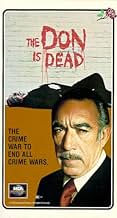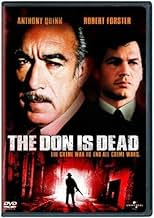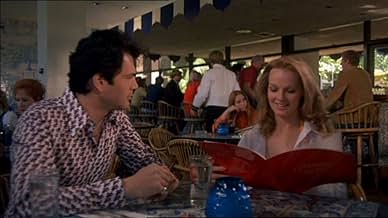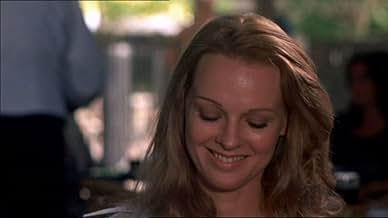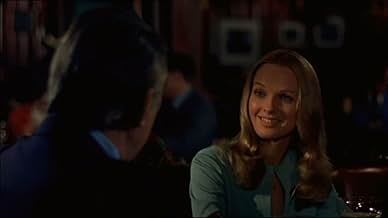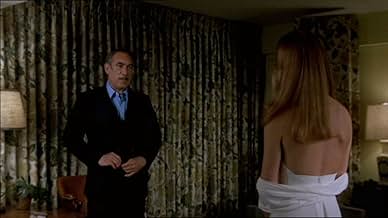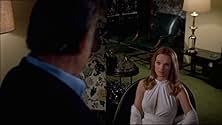IMDb रेटिंग
6.2/10
1.6 हज़ार
आपकी रेटिंग
अपनी भाषा में प्लॉट जोड़ेंAfter his mistress is savagely beaten up a Mafia leader goes after the killer with a bloody vengeance. Soon after the hunt begins, a gang war ensues.After his mistress is savagely beaten up a Mafia leader goes after the killer with a bloody vengeance. Soon after the hunt begins, a gang war ensues.After his mistress is savagely beaten up a Mafia leader goes after the killer with a bloody vengeance. Soon after the hunt begins, a gang war ensues.
John Duke
- Don Aggimio Bernardo
- (as J. Duke Russo)
Frank DeKova
- Giunta
- (as Frank de Kova)
फ़ीचर्ड समीक्षाएं
"The Don Is Dead" is clearly an attempt to cash in on the success of "The Godfather" which was made the previous year. Very few people regard "The Don Is Dead" as a great movie, but many admire "The Godfather" enormously. (There are also many who do not, particularly fans of gangster films in general. Their attitude was brilliantly summarised by Ian Cameron in his book "The Gangster Film" where he described "The Godfather" as "built to be the "Gone With The Wind" of the crime genre, which is to say a crime movie for people who despise crime movies but are impressed by gigantic, best selling novels, a movie for people who do not even much like movies.")
"The Don Is Dead" borrows from "The Godfather" the central theme of a younger, less forceful, less impressive brother maturing during a crisis and developing both leadership qualities and murderous ruthlessness. It also borrows the carefully explained structure of the crime family with its leader (the Don) and its adviser. Fortunately, "The Don Is Dead" takes nothing else from "The Godfather". It does not aspire to be a "Gone With The Wind" of gangster movies. It is content to be an enjoyable, fast-moving well-made crime film. "The Don Is Dead" was made by a team of top Hollywood professionals, and their expertise is evident throughout.
In a city dominated by three crime families, the adviser of one hatches a scheme to grab control of the city by setting the other crime families against each other. For a time his plan works well, and gang warfare breaks out. One of the family heads is dependant on two brothers who kill for him. The younger of these brothers is reluctant to participate but is more intelligent than both his brother and his friend, the crime Don. Gradually, as the violence accelerates, the younger brother assumes command.
The pacing of "The Don Is Dead" is excellent. Each scene is tightly cut but nothing is rushed. Whether an action scene or a whispered conversation, everything is given as much time as necessary but nothing more. The shootings and bombings - of which there are many - are done properly: in other words quickly but credibly. Neither John Woo-style ludicrously fast cutting nor Sam Packinpah-type slow motion diminish "The Don Is Dead".
With one exception, the acting is good throughout. It was enjoyable to see Anthony Quinn in a modern role and wearing smart city clothes. Quinn, of course, has enormous power on screen, but so too have some of the actors in supporting roles. The exception is Frederic Forrest who has neither the acting skill nor the screen charisma adequately to flesh out the main role of the younger brother. He is further hampered by his whining voice. Throughout he gives the impression of being weak and petulant. A key scene is when he returns to his base which has been bombed in his absence and learns that his brother has been killed. His men are about to quit. After a moment or two of private grief, he shouts at his men that they will strike back, and restores their self-confidence and determination. Actors like Charlton Heston and George C. Scott could have worked miracles with that material, but Frederic Forrest just stands there and whines. It is difficult to imagine any hardened criminal regarding him as a leader.
The cinematography is excellent, and Richard H. Kline deserves congratulation for creating in a colour movie the chiaroscuros traditionally found in black and white crime films of the 1940s. Jerry Goldsmith provides an atmospheric, low-key score which consistently increases the tension. During his career Richard Fleischer never received due credit for being a brilliant director, probably for the same reason that Michael Curtiz, John Huston and Robert Wise did not: he was versatile and made a wide variety of movies instead of working with the same subject matter again and again. In his staging and pacing of scenes, his handling of the actors - with that one exception - his placement of the camera and in the high quality work he elicited from his crew, Fleischer demonstrates in "The Don Is Dead" that he was a master film director.
"The Don Is Dead" is probably not a film for every-one, but any-one who likes a good gangster movie should make a point of seeing it.
"The Don Is Dead" borrows from "The Godfather" the central theme of a younger, less forceful, less impressive brother maturing during a crisis and developing both leadership qualities and murderous ruthlessness. It also borrows the carefully explained structure of the crime family with its leader (the Don) and its adviser. Fortunately, "The Don Is Dead" takes nothing else from "The Godfather". It does not aspire to be a "Gone With The Wind" of gangster movies. It is content to be an enjoyable, fast-moving well-made crime film. "The Don Is Dead" was made by a team of top Hollywood professionals, and their expertise is evident throughout.
In a city dominated by three crime families, the adviser of one hatches a scheme to grab control of the city by setting the other crime families against each other. For a time his plan works well, and gang warfare breaks out. One of the family heads is dependant on two brothers who kill for him. The younger of these brothers is reluctant to participate but is more intelligent than both his brother and his friend, the crime Don. Gradually, as the violence accelerates, the younger brother assumes command.
The pacing of "The Don Is Dead" is excellent. Each scene is tightly cut but nothing is rushed. Whether an action scene or a whispered conversation, everything is given as much time as necessary but nothing more. The shootings and bombings - of which there are many - are done properly: in other words quickly but credibly. Neither John Woo-style ludicrously fast cutting nor Sam Packinpah-type slow motion diminish "The Don Is Dead".
With one exception, the acting is good throughout. It was enjoyable to see Anthony Quinn in a modern role and wearing smart city clothes. Quinn, of course, has enormous power on screen, but so too have some of the actors in supporting roles. The exception is Frederic Forrest who has neither the acting skill nor the screen charisma adequately to flesh out the main role of the younger brother. He is further hampered by his whining voice. Throughout he gives the impression of being weak and petulant. A key scene is when he returns to his base which has been bombed in his absence and learns that his brother has been killed. His men are about to quit. After a moment or two of private grief, he shouts at his men that they will strike back, and restores their self-confidence and determination. Actors like Charlton Heston and George C. Scott could have worked miracles with that material, but Frederic Forrest just stands there and whines. It is difficult to imagine any hardened criminal regarding him as a leader.
The cinematography is excellent, and Richard H. Kline deserves congratulation for creating in a colour movie the chiaroscuros traditionally found in black and white crime films of the 1940s. Jerry Goldsmith provides an atmospheric, low-key score which consistently increases the tension. During his career Richard Fleischer never received due credit for being a brilliant director, probably for the same reason that Michael Curtiz, John Huston and Robert Wise did not: he was versatile and made a wide variety of movies instead of working with the same subject matter again and again. In his staging and pacing of scenes, his handling of the actors - with that one exception - his placement of the camera and in the high quality work he elicited from his crew, Fleischer demonstrates in "The Don Is Dead" that he was a master film director.
"The Don Is Dead" is probably not a film for every-one, but any-one who likes a good gangster movie should make a point of seeing it.
How could a movie starring Anthony Quinn, Robert Forster, Frederic Forrest, Al Lettieri, directed by Richard Fleischer and centering on cutthroat mobsters slightly miss the mark, or, not be an incredible masterpiece?
Probably because there's not much of a target to begin with, and yet, that's not such a bad thing since the breezy undertone provides a cushion of what feels like actor improvisation under the edgy, multi-plotted schemes going on... And on and on...
The story, or one of many stories, centers on a brash climber, played by Forster, who, using a somewhat contrived Brooklyn accent and not seeming as natural and genuine as usual... along with two hired guns, The Fargo Brothers played by Forrest and Letteri... are a collected trio of goons with an ambitious attempt to overthrow a newly-made don, Anthony Quinn, playing white knight to Forster's beautiful, and abused, girlfriend (cult starlet Angel Tompkins): a victim who dreams of being a famous singer.
Lightweight melodrama befitting a TV movie-of-the-week makes a lot of whistling in the cemetery - but with a catchy tune...
There are so many twists (everyone wants to kill everyone) you may need a scorecard after a while, or instructions: Although Robert Forster goes from a temperamental wild card to a downright awful bully that the audience winds up rooting against, he's much more likable than Quinn, a brooding know-it-all who, alas, is the sole DON IS DEAD hero since, well, he's Anthony Quinn...
And despite too much talk and not enough action, there are some decent gunfights between exposition and so, with all the twists and turns, pay attention and you may just follow this jigsaw puzzle that works better incomplete than when it attempts an 11th hour resolution...
What makes it fit slightly within the Noir category despite following more of a "Modern" Classic Gangster template is that the good guys and the bad are all in the mafia i.e. where there's a moral compass in a school of sharks, it's usually within a Film Noir shoreline.
Probably because there's not much of a target to begin with, and yet, that's not such a bad thing since the breezy undertone provides a cushion of what feels like actor improvisation under the edgy, multi-plotted schemes going on... And on and on...
The story, or one of many stories, centers on a brash climber, played by Forster, who, using a somewhat contrived Brooklyn accent and not seeming as natural and genuine as usual... along with two hired guns, The Fargo Brothers played by Forrest and Letteri... are a collected trio of goons with an ambitious attempt to overthrow a newly-made don, Anthony Quinn, playing white knight to Forster's beautiful, and abused, girlfriend (cult starlet Angel Tompkins): a victim who dreams of being a famous singer.
Lightweight melodrama befitting a TV movie-of-the-week makes a lot of whistling in the cemetery - but with a catchy tune...
There are so many twists (everyone wants to kill everyone) you may need a scorecard after a while, or instructions: Although Robert Forster goes from a temperamental wild card to a downright awful bully that the audience winds up rooting against, he's much more likable than Quinn, a brooding know-it-all who, alas, is the sole DON IS DEAD hero since, well, he's Anthony Quinn...
And despite too much talk and not enough action, there are some decent gunfights between exposition and so, with all the twists and turns, pay attention and you may just follow this jigsaw puzzle that works better incomplete than when it attempts an 11th hour resolution...
What makes it fit slightly within the Noir category despite following more of a "Modern" Classic Gangster template is that the good guys and the bad are all in the mafia i.e. where there's a moral compass in a school of sharks, it's usually within a Film Noir shoreline.
And also very faithful to Marvin Albert's work. I read it six times in my life, the first one when I was 16. This is of course influenced by GODFATHER, borrowing a couple of the actors of Corleone saga. This story could easily have given a mini series, because you have focus on many sub characters and plots. But the book was not that huge either. I I have always enjoyed this Dick Fleischer's feature. And watch out for the faces here. As were THE UNTOUCHABLES. The good thing here is that you have not real lead character, mainly supporting ones, or the one you may think the lead is actually not the winner at all.... As in the Marvin Albert's novel.
In his career, movie director Richard Fleischer made some very good movies, "Compulsion" and "The Narrow Margin" being just two of them. However, when he reached the 1970s, though he made a few more good movies ("The Spikes Gang", "Soylent Green") his talent started to decline, and before the decade was over he started to make an unbreakable string of stinkers up to the point he retired in the late 1980s. "The Don Is Dead" was the first sign that in the early 1970s that he was going past his prime. To be fair, it seems that he wasn't given a lavish budget for this movie. The movie is so obviously shot on phony- looking back lots and sets, giving the movie a made-for-TV feeling. (This shabby look may be why music composer Jerry Goldsmith wrote a very television-style musical score for the movie.) And the script is nothing to shout about, having a bunch of mobster-themed plot turns that we've seen many times before. Some of the acting isn't bad - the movie is filled with talented actors, not just Anthony Quinn. But you don't just go to a movie to see good acting, you want an engaging story and characters, which for the most part this movie simply does not have.
Richard Fleischer was a very good craftsman of the 7th art, very prolific, excelling in different genres: Action, Adventure, Sci-Fi, History, Crime, Drama,
Mystery, Music, Romance, Biography, he approached almost all genres. It delighted my childhood, adolescence and youth with movies such as: "20,000
Leagues Under the Sea", "The Vikings", "Barabbas", "Fantastic Voyage", "The Boston Strangler", "Tora! Tora! Tora!", "The New Centurions", "Soylent Green", "Mr. Majestyk", "The Incredible Sarah", "The Jazz Singer", "Conan the Destroyer", "Red Sonja". "The Don Is Dead" it's a film like Francis Ford Coppola's "The Godfather". We also have two actors who starred in both films: Abe Vigoda and Al Lettieri, both predestined to play mobsters. This is not an ordinary review, but a tribute to Al Lettieri. He is the best actor in "The Godfather". Here he has a similar role, but it's more temperate. In both films he's killed by rival mobsters. This actor, who played only mobsters and other
villains, instinct tells me, would have deserved a role of honest man, a positive hero in at least one film. Usually, in a movie starring Anthony Quinn, he's the reason I want to see the movie. This time, Lettieri was the first reason, Quinn was the second. Quinn also plays a great role as a mobster here, especially in the final scene, when he looks like a vegetable. In other very good roles are: Frederic Forrest, Robert Forster, Angel Tompkins, Charles Cioffi.
क्या आपको पता है
- ट्रिवियाActors Abe Vigoda and Al Lettieri had recently appeared in Francis Ford Coppola's The Godfather (1972).
- कनेक्शनReferenced in Romeo Is Bleeding (1993)
टॉप पसंद
रेटिंग देने के लिए साइन-इन करें और वैयक्तिकृत सुझावों के लिए वॉचलिस्ट करें
- How long is The Don Is Dead?Alexa द्वारा संचालित
विवरण
- रिलीज़ की तारीख़
- कंट्री ऑफ़ ओरिजिन
- भाषाएं
- इस रूप में भी जाना जाता है
- Beautiful But Deadly
- फ़िल्माने की जगहें
- उत्पादन कंपनी
- IMDbPro पर और कंपनी क्रेडिट देखें
- चलने की अवधि1 घंटा 55 मिनट
- पक्ष अनुपात
- 1.85 : 1
इस पेज में योगदान दें
किसी बदलाव का सुझाव दें या अनुपलब्ध कॉन्टेंट जोड़ें


